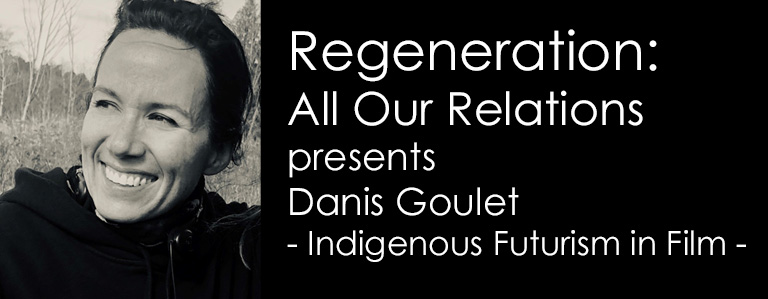On Monday March 7, Sensorium: Centre for Digital Arts & Technology, the department of cinema & media arts, and the imagineNATIVE Film Festival present Regeneration: All Our Relations presents Danis Goulet – Indigenous Futurism in Film.
“Cree-Métis filmmaker Danis Goulet’s first feature film is a haunting and provocative, pulse-quickening journey. Goulet’s work has for some time been invested in the exploration of Indigenous futurity,” says Brenda Longfellow, an associate professor in the department of cinema & media arts and event organizer.
“In her spectacular first feature, Night Raiders, she imagines a dystopian world where Indigenous people have been displaced from their land and ghettoized in reserves. It’s a futuristic storyline but is based on the realities of residential school horrors of the past. What provides hope is the resilience, smarts, and love of Indigenous women” Longfellow continues.
Danis Goulet explains that Indigenous futurism, a term that is a nod to Afrofuturism, is an artistic movement that imagines Indigenous peoples in speculative, science fiction, or other related sub-genres where Indigenous people have generally been excluded.
“For me, it simply means imagining a future for ourselves as Indigenous people.”
This event featuring Danis Goulet is an opportunity for students and faculty to learn more about her new film and the themes of resistance, resilience, community, hope, and love. Goulet will also be talking about situating Indigenous stories within genre film.
Longfellow says this will be an “exciting opportunity to meet a world class Indigenous director and to learn about the multiple ways in which Indigenous filmmakers are practicing Indigenous sovereignty in their work.”
“Until recently, to put it bluntly, the Canadian film industry seemed to follow an apartheid model, especially in terms of excluding Black and Indigenous voices. Thanks to the extraordinary efforts of a new generation of BIPOC artists, this is starting to change, and Danis is at the centre of this change,” says John Greyson, an associate professor in the department of cinema & media arts.
“This event is a must for all of us, faculty and students — both for its focus on decolonizing our dominant settler narrative, and equally, for collectively exploring the poetics of this radical vision, about what such actions look and sound like,” adds Greyson.
“It is now widely acknowledged that the track record regarding representation in Canadian film (and Hollywood for that matter) of marginalized communities — Indigenous, Black, Asian, and LGBTQ — until now has been sorely lacking,” adds Howard Wiseman, an associate professor in the department of cinema & media arts.
Wiseman explains that there are significant changes from the past few years at the decision-making levels at Telefilm, the Arts Councils, and professional organizations that includes the introduction of quotas, specific programs aimed to amplify previously marginalized voices, and the appointment of Indigenous broadcaster and commentator, Jesse Wente, to Chair the Canada Council for the Arts, as well as the creation of a Black Screen Office headed by producer Joan Jenkinson.
“More films are being made that tell previously marginalized stories by BIPOC filmmakers. The greater the opportunities the greater the chances for success. The thing is that these stories themselves have always been there,” says Wiseman. “It’s about opportunities and funding to tell them on our screens.”
Longfellow agrees that we are in a period of tremendous resurgence on the part of Indigenous filmmakers in Canada. ”Thanks to the formation of the Indigenous Screen Office about five years ago, whose mission is to support Indigenous sovereignty on screens and the persistent lobbying efforts, there will be a new wave of incredible, passionate, and talented Indigenous productions in the pipeline.”
“We live in a colonial country that has mostly been unwilling to contend with the violence and horror that Canada was founded upon,” continues Goulet. “The truth of what happened at residential schools has been actively covered up in favour of national narratives that serve a colonial agenda. The curriculum is a reflection of this.
“Therefore, there is much work to be done to face the truth of our colonial history in order to determine what our future may be,” Goulet concludes.
To learn more about this event and to register, click here.


